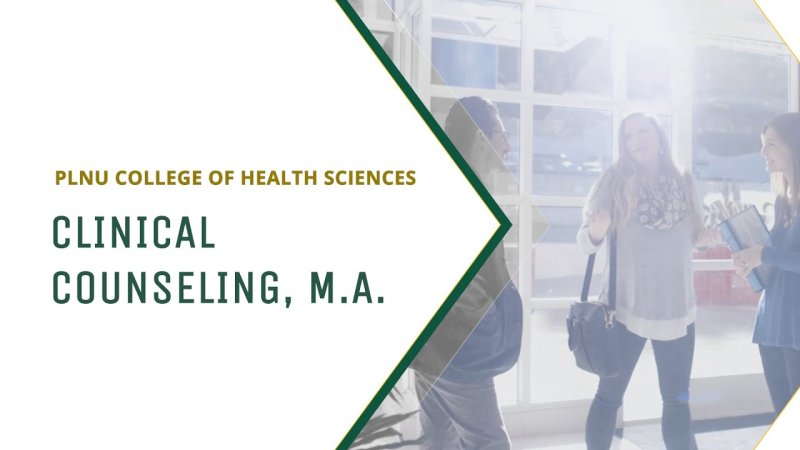
A drive to help others or a calling to serve communities through counseling may be a good indicator of what you are best suited for.
Is a Master's in Clinical Counseling Right for Me?
Counseling can make a profound impact on people's lives. If you have a passion for helping individuals overcome challenges with mental health, want to help people improve their marriages or family interactions, or would like to be better equipped to counsel others, a master's in clinical counseling (MACC) might be the path for you.
With a master's in counseling, you can work as a clinician, therapist, or counselor in a variety of treatment settings for people who need your help. Courses are designed around topics like clinical assessments, diagnosis, relationships, and other subjects, which prepare you for your role helping others.
What is a Clinical Counselor?
A clinical counselor is a licensed mental health professional qualified to serve individuals experiencing emotional, psychological, and relational challenges.
Clinical counselors use evidence-based therapeutic approaches to help clients:
- Improve their mental well-being
- Develop coping skills
- Navigate life's challenges
Clinical counselors work in various settings including private practice, community agencies, hospitals, schools, and rehabilitation centers.
Earning your MACC is a career track that allows you to gain the necessary certifications to serve individuals with mental health concerns or work with families and solve relational issues, depending on the licensure track you choose.
PLNU’s M.A. in Clinical Counseling allows students to choose to obtain licensure as either a licensed professional clinical counselor (LPCC) or a licensed marriage and family therapist (LMFT). While the course requirements remain the same for both tracks, they emphasize different skills you'll develop for your future career after graduation.
__________
Who are you called to be?
Pursue your purpose at PLNU.
__________
LPCC or LMFT
Counselors licensed in the LPCC route will tend to focus on individual counseling, working on diagnosing and treating mental illnesses, traumas, substance abuse, or other disorders.
Individuals who choose an LMFT track often go on to work in interpersonal or relational therapy. This track includes a wide range of topics from early family relationships to marriage and divorce counseling. It also lends itself to speaking with patients about conditions which might be more specific, like mental illness.
As of January 1, 2022, LPCCs are no longer required to complete additional coursework to treat couples and families. According to the California Association of Licensed Professional Clinical Counselors (CALPCC), this change removes barriers that previously existed, allowing both LMFTs and LPCCs to work with individuals, couples, and families.
Whether you plan to work in health centers, hospitals, government services, or private practice, there is a growing need for mental health professionals in virtually every sector. The LPCC and LMFT tracks will both prepare you to make a difference in the lives of the people you work with and the communities you serve.
Interested in learning more? Read on in our article “The Differences Between an LMFT and LPCC.”
What to Look for in a Good Counseling Program
Deciding to pursue this career track is a big step. Making sure the program you choose fits your needs and helps you grow can be equally as important.
How long does the program take?
A typical master's program in clinical counseling can take around two to three years, including the time it takes to complete your practicum hours for graduation. (The licensure hours are completed post-degree.)
Affordability
Finding a university with financial aid and scholarships to help you meet your professional goals is important. Knowing the university you are attending has your best interest in mind and will be there to support your needs can help to mitigate some of the stress or challenges you might face while going through school.
State-based standards
The state where you attain your degree and license to begin counseling may not be the place you intend to practice, so it is useful to know the requirements of the board where you plan to work.
Practicum experience
On-campus programs
PLNU's on-campus MACC has teamed up with The Center for Enriching Relationships to provide graduate students the opportunity to serve actual clients in a pre-practicum experience, which allows community members to obtain low-cost counseling while the program helps to develop counselors with hands-on experience and expertise.
Online programs
PLNU's online MACC program utilizes "simulated patients" (similar to what medical schools use) that provide individualized feedback. This innovative approach ensures that online students still receive practical, skill-building experiences that prepare them for real-world clinical settings.
The importance of practicum
Practicums are a crucial first step in becoming a counseling professional. This supervised experience allows individuals to grow in the specific areas of therapy they may want to specialize in while receiving assistance from trained professionals.
While participating in practicum, students can ask questions, witness the real-life application of their learning, and obtain greater knowledge about what they might want their career to look like after graduation.
Teamwork and support
On-campus programs
Many graduate schools use cohorts to allow students to work together and maintain a sense of community throughout the program. The goal is for everyone in a group to start and end the program together, taking synchronous courses and developing themselves while helping their peers grow as well.
This gives everyone the ability to learn from and support one another as they work through the demands of this graduate degree.
Online programs
While the online MACC program doesn't use a traditional cohort model, it has opportunities for connection, support, and mentoring built into the curriculum. Online students benefit from a collaborative learning environment that fosters professional relationships while offering the flexibility needed to balance education with other life commitments.
Choosing a Program That’s Right For You
It is best to find a program which will prepare you for your career in counseling others and also meets your educational needs. This post-secondary degree can shape you in your career going forward.
Practical, hands-on experience is important. PLNU's MACC program offers aspiring counselors a 63-unit program, which can take anywhere from 24 to 48 months depending on your chosen format (on-campus or online). The program is designed to prepare you for both LMFT and LPCC licensure, with specialized coursework that integrates faith-based principles with evidence-based practices.
Click here to find out more about the on-campus MACC, or here for more on our online program.
Feel free to contact us if you have any questions, or take the next step in your career and apply today.
